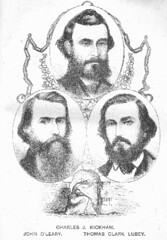Sunday, March 05, 2006
Today in History - Fenian Rising begins
 It was on this day, 5th March, 1867, that the Fenian Rising began in Dublin, Cork, Limerick, Clare and Tipperary.
It was on this day, 5th March, 1867, that the Fenian Rising began in Dublin, Cork, Limerick, Clare and Tipperary.The picture to your left is the police station at Tallaght in Dublin in 1867. This was the scene of the 'Battle of Tallaght' which took place between the police and the Dublin Fenians.
The 1867 Rebellion ultimately failed for a number of reasons. Despite the fact that they were a secret oath-bound society, the Fenians' plans were betrayed to the authorities who were fully aware of what was about to take place and were prepared for the event. In addition, several Fenian leaders had been arrested prior to the insurrection. O’Donovan Rossa had been arrested in 1865 at a time when he was also manager of "The Irish People". Plans, which were haphazard to say the least, were also frequently mis-interpreted or failed to reach those for whom they were intended, and, to crown it all, there was a heavy snowstorm on the night of the uprising, causing chaos and making communication between the various groups extremely difficult. Add to that the fact that the insurgents were poorly armed and very few had any experience of how to wage war.
The failure of the Rising on March 5th was sealed when General Massey of the Fenians was captured at Limerick Junction, after an informer supplied the British Army with information about the rebellion. Massey too told the British everything he knew, and the day was lost.
Eventually most of the leaders of the rebellion were arrested by the authorities and the trials of Charles J. Kickham, O'Donovan Rossa, John O'Leary and Thomas Clarke Luby caused huge uproar in Ireland when renowned (and widely hated) conservative Catholic judge William Keogh was appointed to try their cases. Called "the solo-trombone in the Pope's brass band," his appointment meant a completely unfair trial for those accused.
Their counsel, Isaac Butt, who went on to become the first Home Rule leader, presented a case which centred around the fact that the men saw Ireland as an independent state from Britain and that they viewed armed uprising as the only means of attaining this objective.
Following the 1867 uprisings many leaders were captured,tried and sentenced to death, but this was usually commuted to ‘transportation’ to Australia. Despite the failure of 1867, the influence of the Fenians (IRB) actually increased and they would play a prominent part in Irish history over the next half century, particularly in the lead up to, and the acting out of, the Rising of 1916.
Fenian leaders

I think this event in history, which occurred today 139 years ago, is an important point in Irish history as it showed the British authorities that not everyone in Ireland was satisfied with the status quo. Also, many of the 1916 Rising leaders would be heavily influenced by the men of '67 such as O'Donovan Rossa, who bridged a link, in their eyes at least, between groups like the United Irishmen and Young Ireland and who carried on the legacy of Irish republicanism.
I think it's important that we acknowledge the 1867 rebellion as it tends to be overlooked in favour of the 1916 Rising and the United Irish rebellion but I feel it is just as important as it carried on the republican tradition. I'll finish with these inspiring words from the dock by Thomas Clarke Luby, who was sentenced to 20 years of Penal Servitude, as I feel they are relevant to events which were to come later in Ireland:
"I believe the majority of my countrymen this minute, if, instead of my being tried before a petty jury, who, I suppose, are bound to find according to British law - if my guilt or innocence was to be tried by the higher standard of eternal right, and the case was put to all my countrymen - I believe this moment the majority of my countrymen would pronounce that I am not a criminal, but that I have deserved well of my country. When the proceedings of this trial go forth into the world, people will say the cause of Ireland is not to be despaired of, that Ireland is not yet a lost country - that as long as there are men in any country prepared to expose themselves to every difficult and danger, in its service, prepared to brave captivity, even death itself, if need be, that country cannot be lost. With these words, I conclude."
© 2008 United Irelander.

